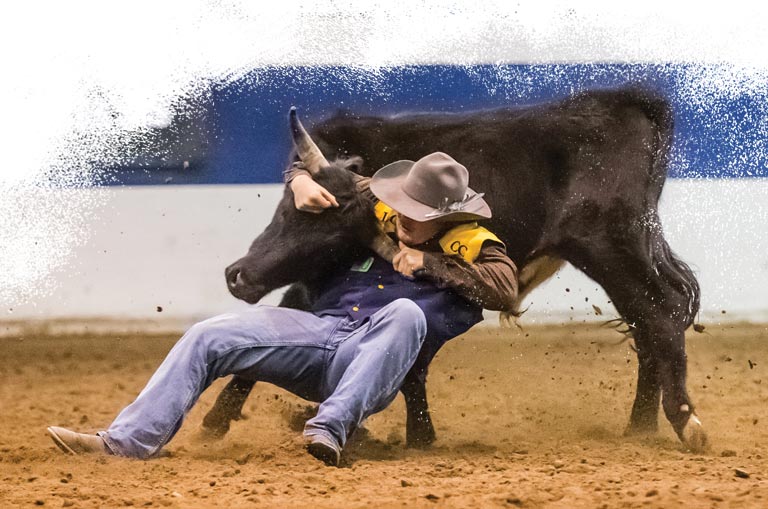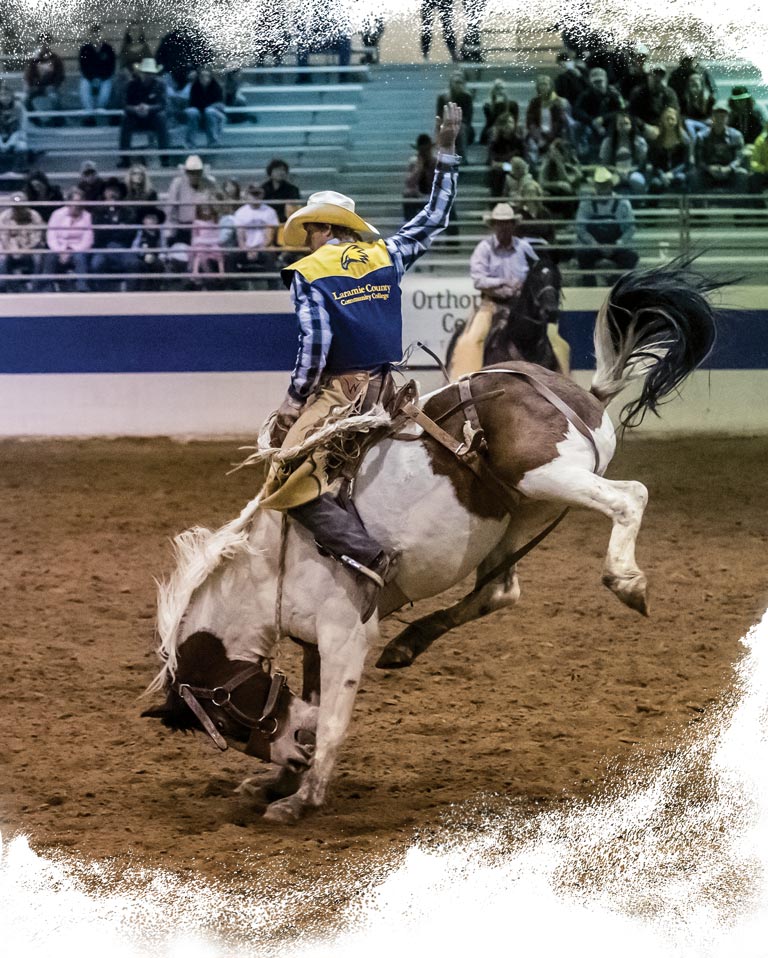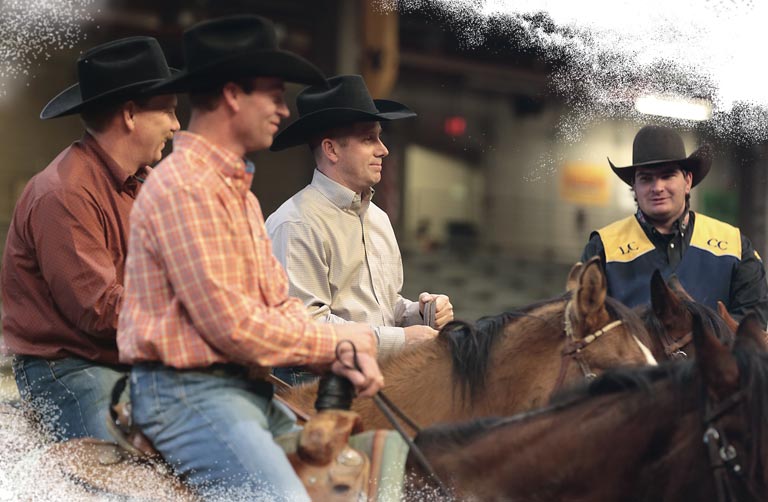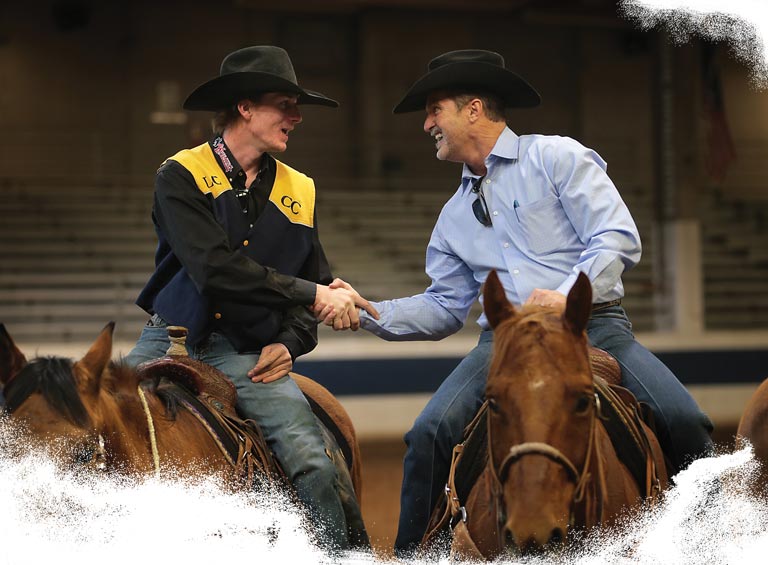Riding for the brand




For all that's changed in the sport of college rodeo in the last 25 years, a lot has stayed the same.
Hunter Cathcart, Tony Seidling, Brian McNight and Tommy Cress (shown left to right) were on the Laramie County Community College rodeo team in the mid- to late-1980s. They came back to LCCC recently to relive some of their glory days.
And even though their paths have taken them in different directions, the threads of rodeo and friendship are visible in every interaction, every good-natured ribbing, every shared story.
It starts with a smell. The smell of the arena where the four were interviewed.
"I went to a Christmas party once and somebody made some horrible crab cakes," Seidling started. "They tasted like the dirt in this arena. And I know – I've eaten plenty of it."
The laughter grows and stories fly fast and furious. They talk about the events, the coaches, even that Cress' kids are both in rodeo at Tarleton State University.
And the smell, the laughter and the camaraderie take them all back to their times at LCCC.
"Rodeos were good, but the practices were a heckuva lot of fun," Seidling said, and shared memories brought a smile to everyone at the table.
"The format's still the same," Cathcart said. "They still have the same events. They still have 10 rodeos in the season. And it's still a sport where the athlete is trying their best, while everybody – no matter whose team they ride for – cheers that competitor on."
The amount of work is intense. Cress said depending on the practice, the student-athletes were either working on their rodeo skills by climbing down on bull after bull or helping their teammates by working the chutes or moving livestock through the alleys.
"Everybody had a job to do," he said. "These kids are part of a team, and if they're not riding something, they're helping out so other kids can get some practice riding."
In those days, rodeo practice could be brutal; the words "freezing" and "deathtrap" are spoken more than once. But that changed with the construction of that new indoor arena.
"There's not a nicer college rodeo arena in the country. We've rodeoed professionally, been to amateur ones, colleges, done it all. Honestly you won't find a better setup," Cress said, remembering how it compelled him to come to school here.
"We drove here from Pueblo. The doors happened to be open, we walked in and said 'we're gonna go to school here.' That's how I ended up here. It was just seeing the arena."
With a bigger team, more livestock to manage, and more demands on the arena facilities, there might even be more work for current rodeo team members these days. LCCC's new rodeo coach Beau Clark says his team members did a lot of work on the college's outdoor arena so they could use it for practices.
"They built a new return alley, fixed up the roping chutes, and did a lot of work to get the ground better," Clark says. "We needed to get it working well so we could practice out there, because there are classes that need the indoor arena, but we still need to practice."
Clark says pitching in comes naturally to his student-athletes.
"I always tell them to 'be the you that you want to be,' not just when you want to, but all the time," he says. Clark says they take their schoolwork seriously, they don't hesitate to help someone who needs a hand, and they're competitors in the arena.
And they have to be. He says the Central Rocky Mountain Region of the National Intercollegiate Rodeo Association is extremely competitive, and they'll have to work hard to win. That's where some of the bigger differences between rodeo of a quarter of a century ago and rodeo today start to show.
Like in any sport, coaching is crucial to rodeo. Clark follows in the footsteps of Russell "Pinky" Walters.
"Pinky had the lease on a rock house over there on Pershing, remember that? It doesn't exist anymore, but he always put his whole rodeo team there until you couldn't fit another person in there," Cress laughed.
"I guess that was one thing I really want people to know, we were really lucky to have a guy like him. I don't know if I rode a horse my whole freshman year of college, I was no good. But Pinky believed in us, took care of us."
The table grows a little silent as the group remembers the man who had such in influence on their lives.
"He wanted you to be prepared for when school was over. He talked about that a lot," Cress continued. "He tried to teach us in everything he did. He's a great man and we were lucky to have him."
"He was never in your face about things, gentle. Just a good guy," Seidling added.
As for the competitors, McNight says when he was on the team, anybody was welcome to come out and give rodeo a try. "Some of those kids seriously just came to college, got a bull rope and got started," he said. "But now, they're recruited. Coaches watch them in high school rodeos and bring the best they can get to college."
Those student-athletes also rode with Shawn Dubie in the late 1980s, and they remember the late cowboy fondly.
In fact, LCCC holds the annual Shawn Dubie Memorial Rodeo every fall to honor him. A saddle bronc rider from Michigan by way of Rock Springs, Dubie rode for LCCC on a rodeo scholarship but died from injuries sustained while competing.
His legacy lives on though – in the rodeo, in his friends, and in the talented students coming up through the ranks.
But whether they're high school rodeo champs or rodeo rookies, students who sign on to ride for LCCC still learn life lessons that prepare them well for future success.
"There are 30 guys not sitting here today who were on that team with us a few decades ago," Cress said. "When I think about them, they're all very successful family guys."
Cathcart agreed. "This place was important to us all. I wouldn't have ever gotten a college degree without rodeo," he said. "It was huge, and this place was good for us."
 LARAMIE COUNTYCOMMUNITY COLLEGE
LARAMIE COUNTYCOMMUNITY COLLEGE